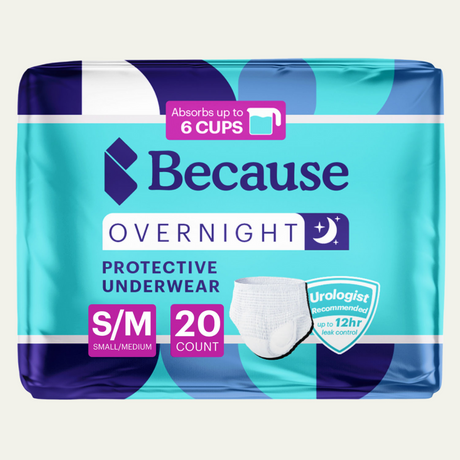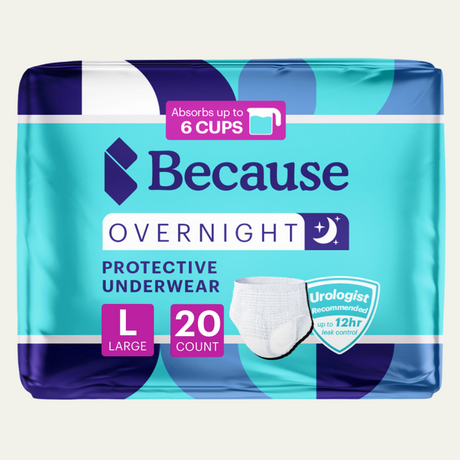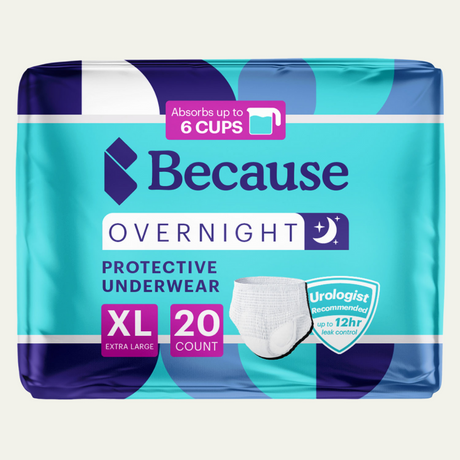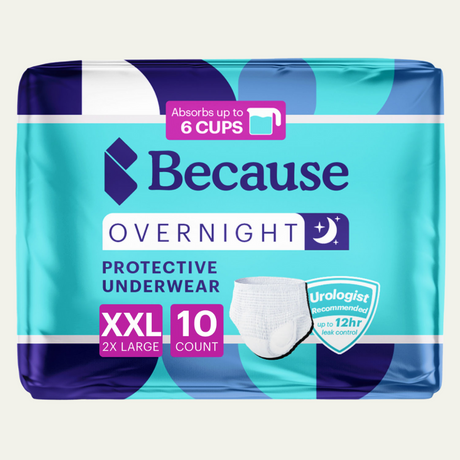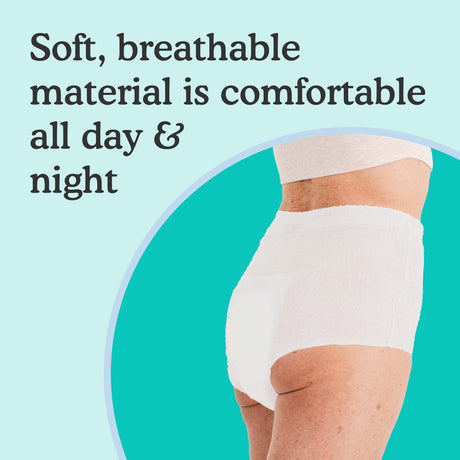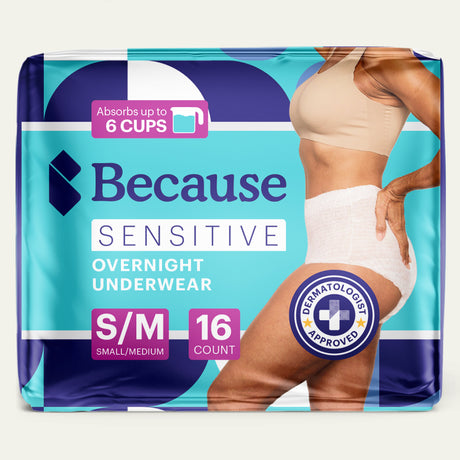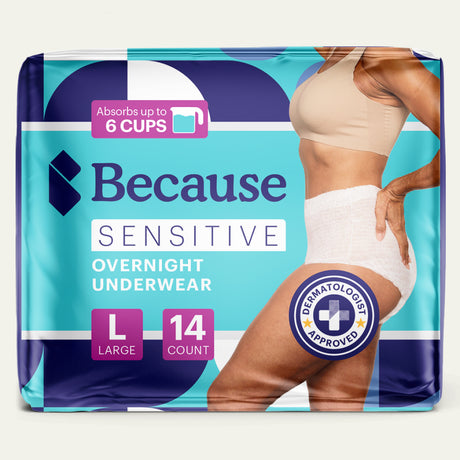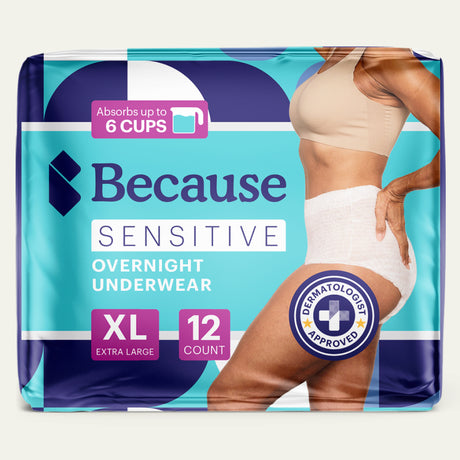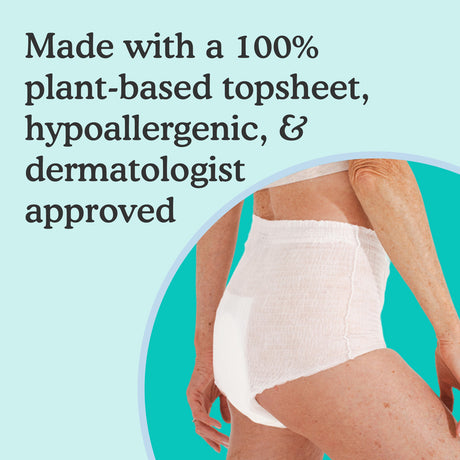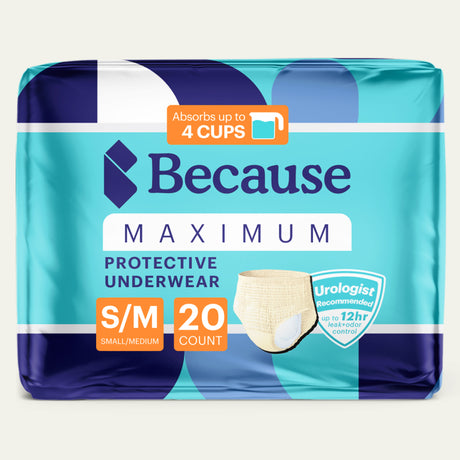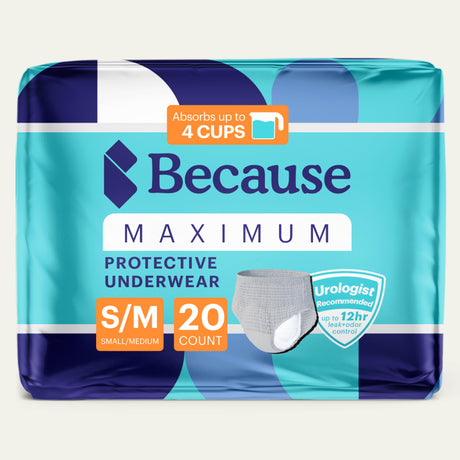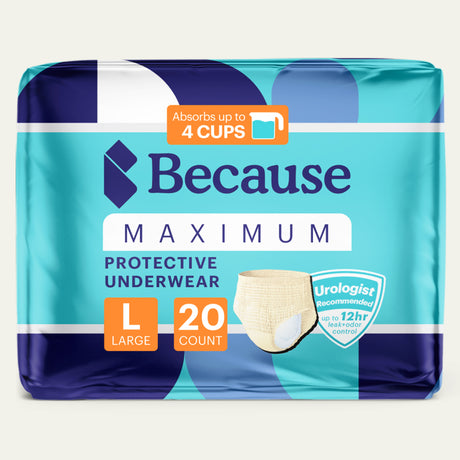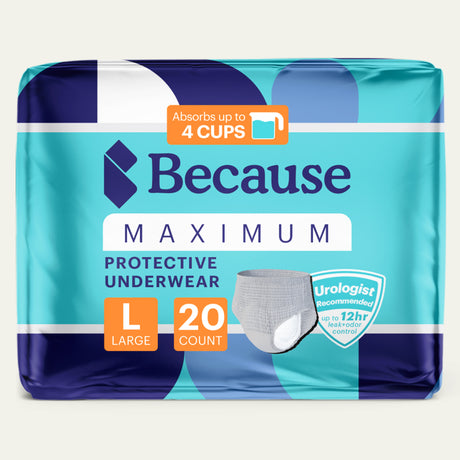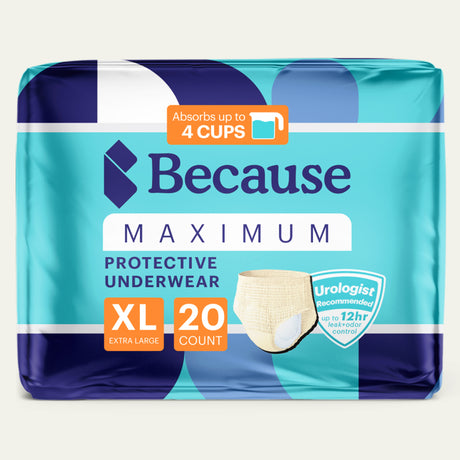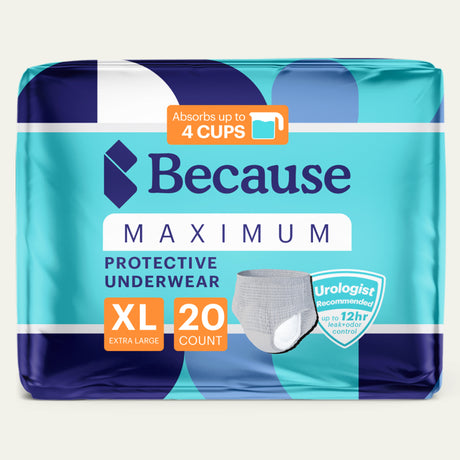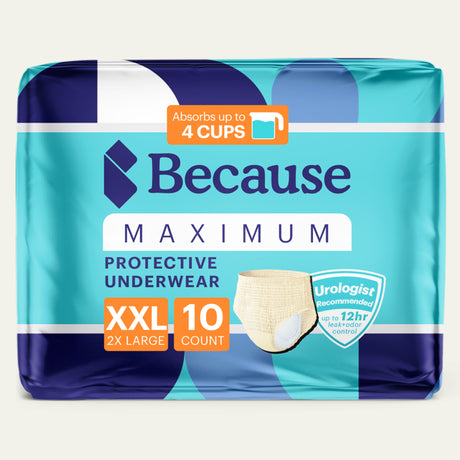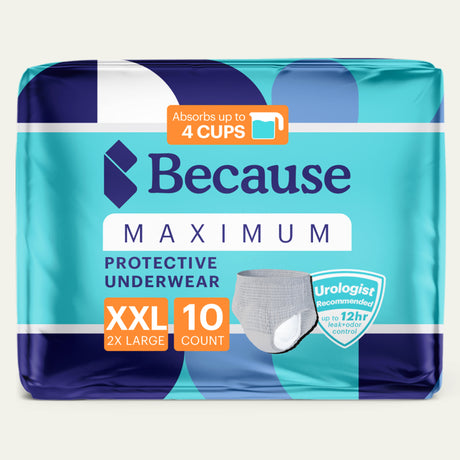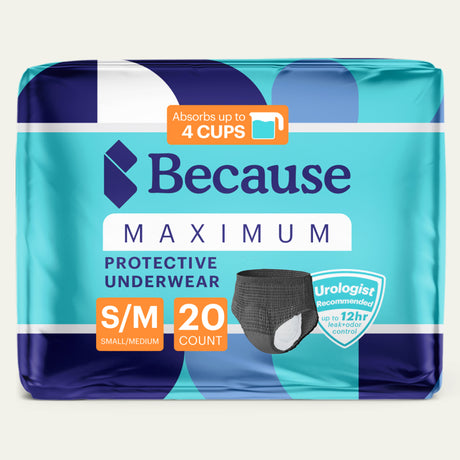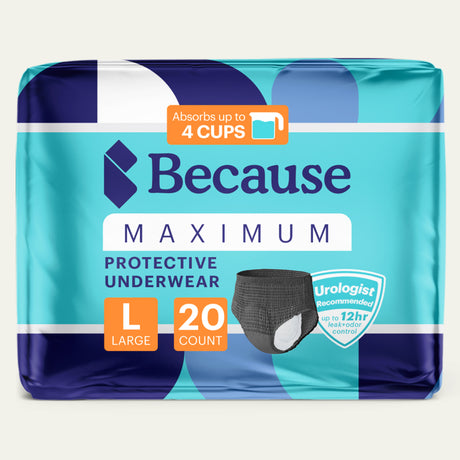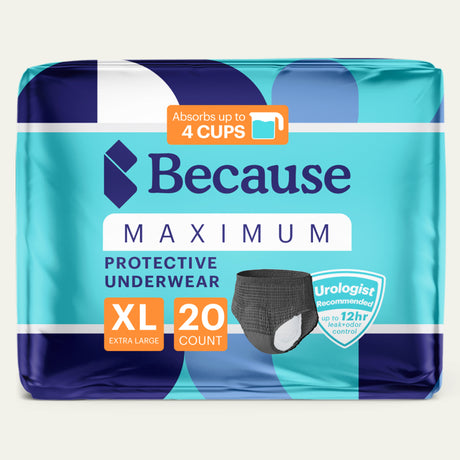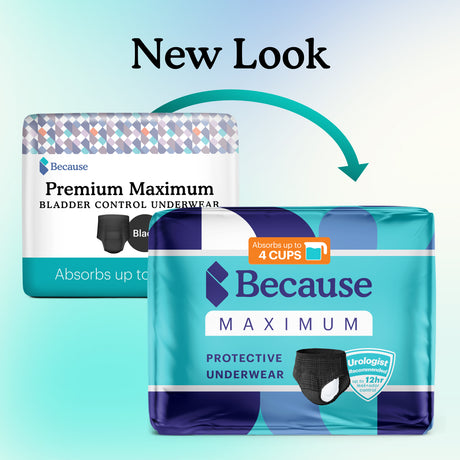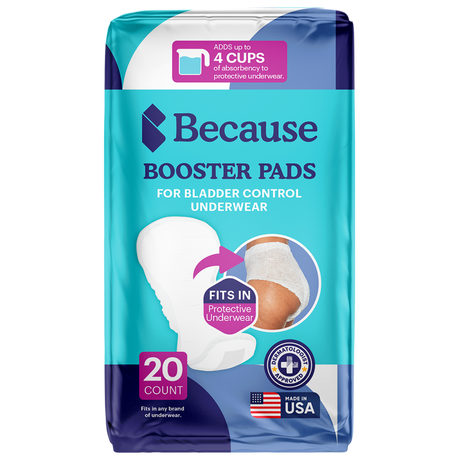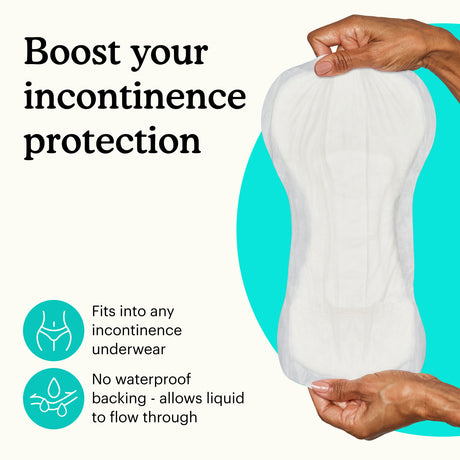Medically reviewed by Dr. Temitope Rude, MD
Can Multiple Sclerosis (MS) Cause Urinary Incontinence?
If you have Multiple Sclerosis (MS), you will probably also develop trouble controlling your bowels at some point. Urinary incontinence is very common in people with MS: 78-90% of people with MS have some form of bowel dysfunction, which can lead to leaks or difficulty urinating.
Incontinence can be a frustrating side effect of MS; however, with good management and treatments recommended by your doctor, it doesn’t have to take over your life.

How Does MS Cause Incontinence?
Multiple Sclerosis is a disorder in which your immune system attacks the myelin sheath that protects your nerves. When this happens, signals don’t transfer as well between nerves, so the messages between the body and brain can take longer to be received or even get lost. This can lead to muscle spasms and stiffness, including spasms in the muscles around the bladder (which holds the urine) and sphincter (which controls the flow of urine).
Overactive or spasming muscles around your bladder or in your sphincter can lead to:
- Frequent urges to pee.
- Urges to pee in the middle of the night.
- Loss of bladder control.
- Difficulty starting urination.
- Stopping urination before your bladder is completely empty.
Daily Management of MS and Incontinence
If you’re newly incontinent because of MS, you might not know that there are many ways to improve your quality of life and stay healthy with incontinence. The first and most important step you should take if you are experiencing new symptoms such as bladder leaks, is to discuss these symptoms with your doctor.
Dr. Tope Rude stresses that incontinence "may be an indication of increasing bladder pressures which can impact the kidneys over time."
Some key tips for daily management of incontinence include:
Use Bladder Protection Products
Absorbent underwear and underwear liners can catch leaks and keep your clothes and skin dry between bathroom visits. If you’re experiencing the frequent urges that are common in MS, you can purchase more absorbent styles designed to catch bigger flows.
Hygiene and Odor Control
It’s especially important to stay clean and dry when managing MS and incontinence, because a bladder or skin infection from incontinence could lead to a flare-up in your MS symptoms.
One key hygiene and odor control tip that may sound counterintuitive is to stay hydrated. Hydration can reduce urine odors by making the urine less concentrated, and it also reduces the risk of a urinary tract infection (UTI). UTIs can lead to symptom flare-ups when your body tries to respond to the infection.
To avoid constant urges, try drinking water periodically rather than sipping throughout the day. Drink the entire glass at once, and space your drinks a few hours apart so you have time to empty your bladder between glasses of water.
It’s also important to keep your skin dry to avoid chafing and odors, so bring extra changes of absorbent underwear when you go out for extra security. You can also bring along cleansing wipes to stay clean and prevent odors after leaks.
Skin Care
If you’re washing more often because of incontinence, it’s important to take care of your skin. Use cleansers that are gentle on your skin, and use protective skin cream to reduce chafing and prevent the moisture from bladder leaks from irritating your skin.
Properly-fitting underwear that doesn’t rub when you move can also help protect your skin from irritation and infections. Don’t be afraid to try a few different styles and sizes until you find something that is comfortable for you!
Supplements
Urinary health supplements can help to prevent infections if you’re practicing self-catheterization or experiencing lots of bladder leaks. These supplements promote the body’s natural defenses and can prevent a buildup of bacteria, but they’re not a substitute for good hygiene or other treatments recommended by your doctor.

MS and Incontinence at Night
People with MS frequently experience nocturia, or the need to pee in the middle of the night. Sometimes you can’t make it to the bathroom before an accident occurs. Nighttime accidents can disrupt your sleep and cause extra headaches to clean up, but if you plan ahead, you can avoid the stress of nighttime incontinence.
Overnight Bladder Protection
Absorbent underwear designed for overnight use can catch up to six cups of liquid (that’s more than the human bladder can hold!), ensuring you and your bed stay dry even if you do have an accident.
Protecting Your Bed from Incontinence
If you’re still worried about a leak, bed pads can bring you peace of mind by covering the mattress and soaking up any extra liquid.
One of the best things you can do to ensure a good night’s rest is to be prepared, and remember that incontinence is a normal side-effect of MS, not something you’ve done wrong. Nearly everyone with MS will experience bladder problems at some point, so you’re not alone.
Lifestyle Tips for Coping with MS and Incontinence
Although incontinence related to MS usually won’t go away completely, there are many ways to manage it so you can continue to do the things you want without the stress of worrying about accidents.
Be Mindful of your Hydration
We’ve already discussed how important staying hydrated is for your health and for reducing odors, but you can also choose when and what you drink to reduce bladder leaks:

Timed Voiding
Schedule your bathroom breaks (e.g. before and after every meal, every time before you leave the house, or every 2-3 hours) and go regardless of whether you feel the urge. This can reduce the urgent need to pee between bathroom breaks.
Practice Kegels
Kegels are a simple pelvic floor exercise that you can practice throughout the day to strengthen your pelvic floor muscles. By strengthening these muscles, you can learn to slow or stop your urine flow when your bladder becomes overactive due to MS.
Quit Smoking
Smoking can irritate the bladder, leading to more frequent urges to pee, so it’s a good idea to stop smoking, if possible, when you’re diagnosed with MS.
Relax and Get Plenty of Sleep
MS symptoms can become worse when you’re stressed or tired, which can also lead to more bladder dysfunction. To reduce your stress levels, try low-impact yoga.

Medical Interventions for MS-Related Incontinence
Daily management is important for maintaining a good quality of life with MS-related incontinence, but you can also talk to your doctor about medication and other treatments to help reduce or prevent incontinence.
Some medical interventions you might want to talk to your doctor about include:
- Medication: There are several medications designed to help treat muscle spasms that cause overactive bladder and which cause a tight sphincter (which can lead to problems both holding your urine and emptying your bladder completely when you pee). These medications can have side effects like dry mouth and confusion, so make sure to talk to your doctor about what medication is best for you.
- Pelvic floor therapy: Training and exercises recommended by a physical therapist can lead to significant improvements in your ability to hold your urine and reduce the number of accidents you have.
- Surgical procedures like Botox, indwelling catheters, nerve stimulation, bladder augmentation, and other advanced therapies if other treatments have failed, but can be extremely helpful for people whose bladder control has been severely affected by MS.
Incontinence is a common side effect of MS, and can be difficult to deal with; however, with smart management you can take back control of your daily life. Absorbent underwear and pads can help catch leaks, and simple exercises and lifestyle changes can significantly reduce the risk of accidents related to overactive bladder and MS. Additionally, there are now many medical treatments available to reduce or eliminate the number of bladder leaks you have with MS-related incontinence, so be sure talk to your doctor about how best to address your symptoms.
Ready to take back control? Get our Free Starter Pack today.
If you or a loved one is struggling with incontinence, join one of our private support groups today!
Women's Incontinence Support Group
Men's Incontinence Support Group

Sources:
Cleveland Clinic. (n.d.). Bladder and bowel dysfunction in multiple sclerosis (MS). Retrieved from https://my.clevelandclinic.org/health/diseases/8453-bladder-and-bowel-dysfunction-in-multiple-sclerosis-ms
Pilutti, L. A., Greenley, M. K., Motl, R. W., & Nickrent, M. S. (2018). Effects of exercise training on fitness, mobility, fatigue, and health-related quality of life among adults with multiple sclerosis: A systematic review to inform guideline development. Archives of Physical Medicine and Rehabilitation, 99(12), 2629-2656. Retrieved from https://www.ncbi.nlm.nih.gov/pmc/articles/PMC6022518/
Fjeldstad, C., Marshall, J., & Nippoldt, T. (2010). Acute exacerbation of symptoms secondary to bladder dysfunction after methylprednisolone in multiple sclerosis: A case report. International Journal of MS Care, 12(2), 83-86. Retrieved from https://digitalrepository.unm.edu/cgi/viewcontent.cgi?article=1033&context=unm_jor


